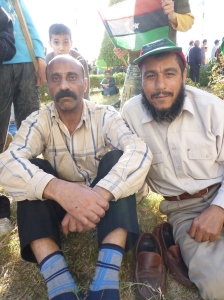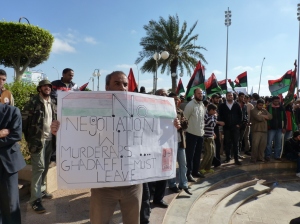A version of this article will appear on Foreign Policy‘s website.
Getting rid of Gaddafi — but at what price? Benghazi residents discuss whether they would accept a peace deal granting immunity to Col. Muammar Gaddafi
BENGHAZI, April 17
Virtually everyone in Libya’s opposition-held east agrees that Muammar Gaddafi must leave Libya for the country’s war to end. But how would Libyans feel about a peace deal that granted the colonel immunity from domestic and international prosecution? Would they accept a hypothetical agreement stipulating that Gaddafi and his children leave Libya tomorrow, bringing an immediate end to the war and the fall of the loyalist regime in western Libya — but on condition that Gaddafi and his family never have to answer for their crimes in a courtroom?
I posed this question to people on Benghazi’s streets. Opinions varied.
“We don’t want any negotiation with Gaddafi — he’s a murderer”
Abduh, 52, stood in front of the Hotel Tibesty holding a sign that read, “NO NEGOTIATION WITH MURDERARS [sic]… GHADDAFI MUST LEAVE.”
“We don’t want any negotiation with Gaddafi,” said Abduh. “He’s a murderer.” Abduh was opposed to any deal that would grant Gaddafi and his sons
immunity. Together with around 2,000 other people, he was protesting the presence of an African Union delegation inside the Tibesty on April 11 that he considered too close to Gaddafi to produce a diplomatic outcome fair to the opposition.
“He’s been killing our people for 42 years,” said Hussein, a 49-year-old shipmaster. “Even if everyone here dies, that’s no problem,” he said defiantly. “There must be international prosecution.”
Khadijah, a 46-year-old engineer standing in the crowded women’s section of the protest area in front of the Tibesty on April 11, agreed. “He’s killed many people — maybe 10,000. And he’s still bombing Misrata, Zuwarah, and the western mountains. There absolutely must be a trial.”
“I myself haven’t had any friends or family die,” said Mus’ab, a 27-year-old oil-company employee. “But all [Libyans] — from the west to the east — they’re our brothers.” He opposed a settlement granting Gaddafi and his sons

Electrical worker ‘Abd al-Hafiz (50, right): “The blood of Libyans is priceless.” He would reject any immunity deal for Gaddafi. Hasan (52), a mechanic, agrees.
immunity. So did Abdul Hafiz, a 50-year-old electrical worker. “The blood of Libyans is priceless. Gaddafi oppressed the Libyan people for 42 years — killing them, hanging them. Now he and his sons are international criminals.” Hasan, a 52-year-old mechanic sitting next to him, nodded in agreement.
Some Libyans insist that Gaddafi must be brought to justice because he will otherwise be a threat to a free Libya. “He has millions in his bank accounts, and if he goes off somewhere in Africa, he could raise an army and try to come back to Libya,” said Suleiman, 26, who co-owns a car-rental agency, on April 17. “Also, there are so many families who lost sons and brothers and fathers during the fighting. He absolutely must be prosecuted.”
“Just go — to save these people”
In the name of saving lives, others would accept a deal that would get rid of Gaddafi without prosecuting him. “He jailed me, and he killed my brother,” said Idris, 39 [conversation in Benghazi, April 17]. This mechanical engineer spent a month in prison — “for being a Muslim,” he says, stroking his three-inch beard in allusion to Gaddafi’s crackdown in the 1980s and 1990s on thousands of Libyans who made the mistake of praying regularly at mosque or growing out their beards. Idris’s brother died during the Abu Salim prison massacre in June 1996, when Gaddafi’s forces killed over 1,200 prisoners.
But despite his personal travails, Idris’s main concern is that Gaddafi leave, to end the ongoing bloodshed. “Just go,” says Idris to Gaddafi. “Save all of these people.” Idris would accept an immunity deal if it would lead to Gaddafi’s immediate departure.
Muraja’, a 70-year-old retiree, agrees. “If it were up to me, yes, that would be ok,” he said, referring to a hypothetical agreement granting Gaddafi and his sons total immunity. But he also expressed conviction that international prosecution would eventually take place, arguing that the question of whether Gaddafi is ultimately tried in an international criminal tribunal is outside the hands of Libyans.

Bobaker, 37, would accept a deal granting Gaddafi immunity in exchange for his immediate departure — “under condition that he be monitored 24-7.”
Bobaker, a 37-year-old mud engineer working in the oil fields of north-central Libya, saw a difference of opinion among different groups in Libyan society. “Most of the people I know,” he said in very good English, “the intellectuals — they would accept this.” He himself would accept such an arrangement as well, but only “under condition that [Gaddafi] be monitored 24/7, including his phone calls — because he’ll still be a threat for Libyans, even if he’s not in Libya.” He was standing in front of the Hotel Tibesty holding a sign that read, “Libyans accept any initiative requires Kadaffi & his sons LEAVE.”
Political constraints on the TNC
The question of what conditions Libyans would accept on Gaddafi’s departure has political implications for the Transitional National Council (TNC), the interim governing body in opposition-held territory. ‘Abd al-Mun’im, a taxi driver in his 30s, would personally be willing to accept an arrangement granting Gaddafi and his sons immunity — but he thinks such a deal is politically infeasible. “I would be ok with that, to save lives,” he said. “But the TNC can’t make a deal like that, because they’d have to face the anger of all of these people who have lost their children and their parents and their relatives in the fighting.”
‘Abd al-Mun’im also estimates that there are significant portions of Benghazi’s population on either side of this hypothetical divide. Conversations with people across Benghazi suggest this is true: it’s not difficult to find people on either side of this question — once the question is posed to them.
That said, the question of whether Gaddafi could be immune from prosecution does not seem to be a frequent topic of conversation, because most people in Benghazi remain hopeful that such a compromise will be unnecessary. Everyone I spoke with hopes that Gaddafi will be prosecuted vigorously, and they view with gratitude those governments who advocate Gaddafi’s departure aggressively. Few seem to expect that the international community would let Gaddafi off the hook. Others note wryly that Gaddafi has sworn enemies outside Libya as well — such as among Lebanon’s Shi’ite community, whose prominent religious leader Imam Musa al-Sadr disappeared in Libya in 1978, allegedly at Gaddafi’s behest.
What Benghazi residents do agree on
Though they may differ on whether they would trade Gaddafi’s instant departure for his immunity from prosecution, Benghazi residents speak with one voice about a number of other issues. One is their insistence that any post-Gaddafi Libyan government be democratically elected and accountable to the people. Another is that civil rights be guaranteed in the new Libya. A third is that Libya’s oil revenues be spent on its people and the rebuilding of Libya’s infrastructure, not on its leader’s children or on preferential handouts to those connected to the regime.
Another issue on which Benghazi residents appear unanimous is that militant religious extremism has no part in the revolution. Many people in Libya’s east are frustrated by international speculation about a possible role for Al Qaeda in their revolution. “Al Qaeda’s beliefs are hated here,” says Mansour, a 40-year-old businessman. “But can you tell me why everyone thinks Al Qaeda is here?” He points to my face and laughs, wondering if it’s because some Libyans have beards. “You have a beard, but you’re not Al Qaeda!”

A protester in front of Benghazi’s courthouse on April 15 says she wants Gaddafi out — in Arabic, Hebrew, English, and French
Indeed, humor itself is a ubiquitous feature of life here — despite the fact that the front line hovers near Ajdabiyah, 160 km to the southwest and the last city before Benghazi on the coastal highway. “I saw a guy holding a sign in front of [Benghazi’s] courthouse a few days ago,” says Suleiman, the car-rental-agency owner. “It read: ‘BREAKING NEWS: Satan defects from Gaddafi regime.’”



[…] from Ryan Calder’s blog revolutionology, where you can continue reading this post. Tags: Gaddafi, Libya var addthis_pub="ucberkeley"; var addthis_options = 'digg, […]
[…] own alienness and hostility to the working and middle class Libyans they rule and exploit. See this blog of an American in Benghazi for what people there think of the […]
[…] Would people accept a Gaddafi immunity deal? […]